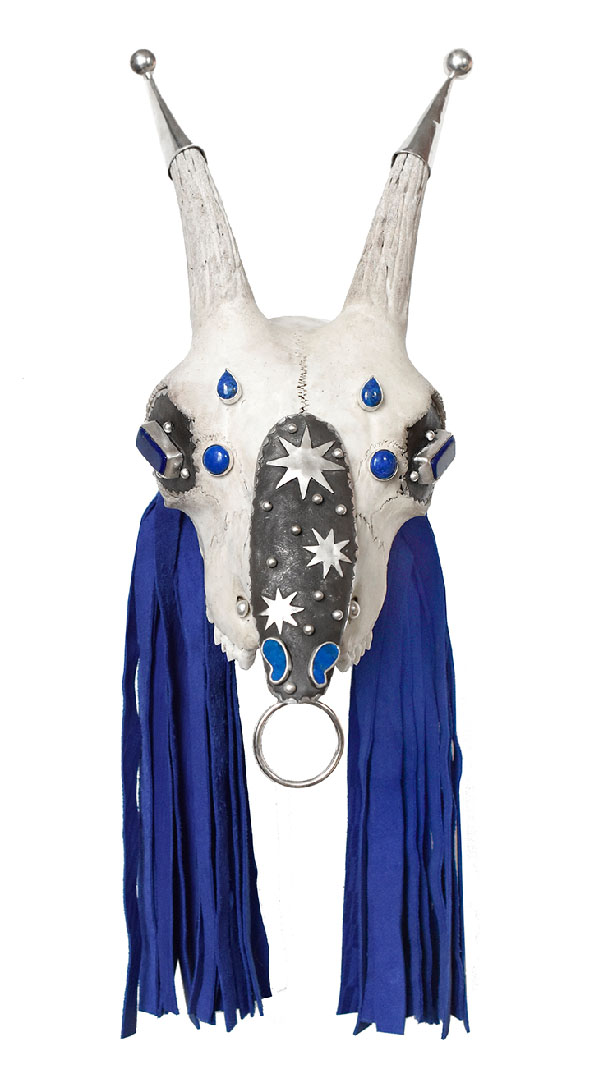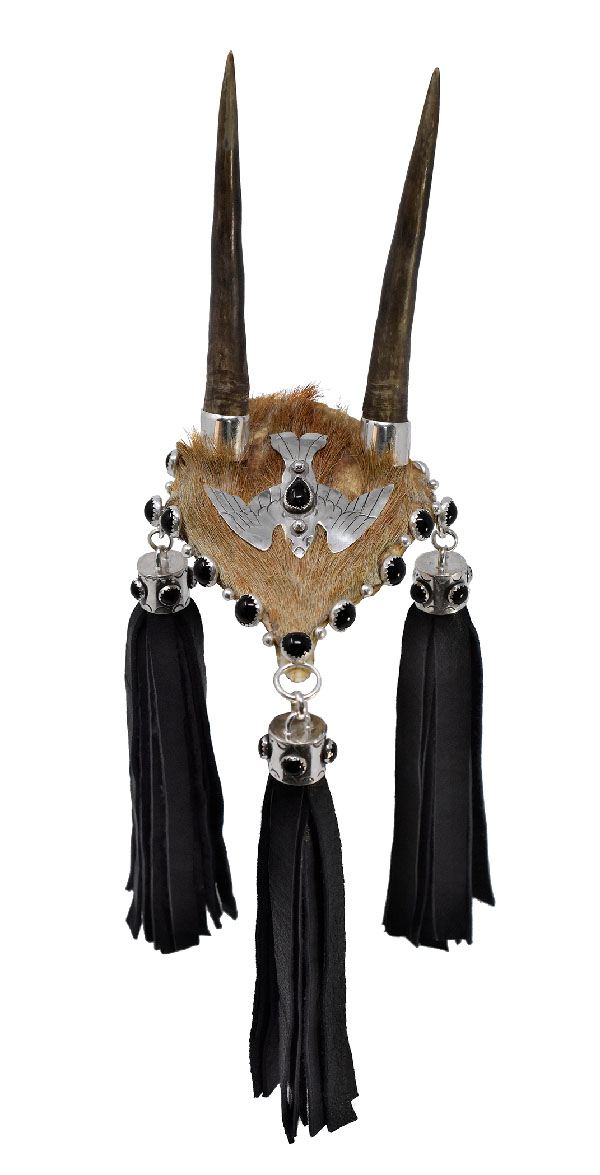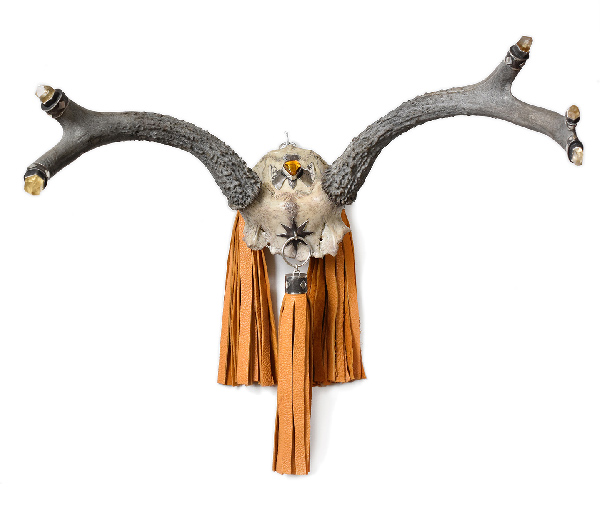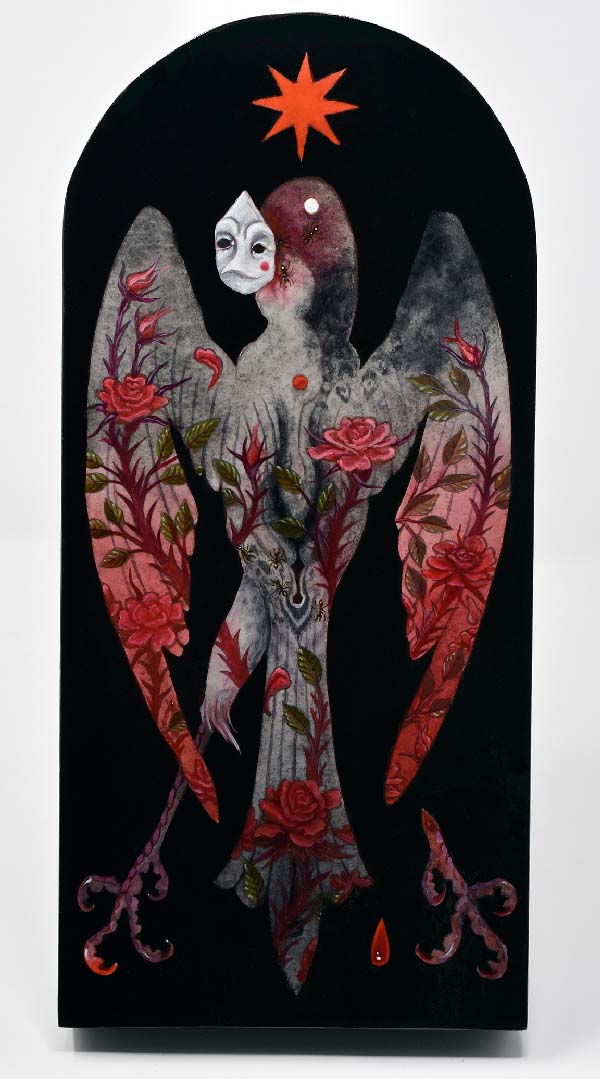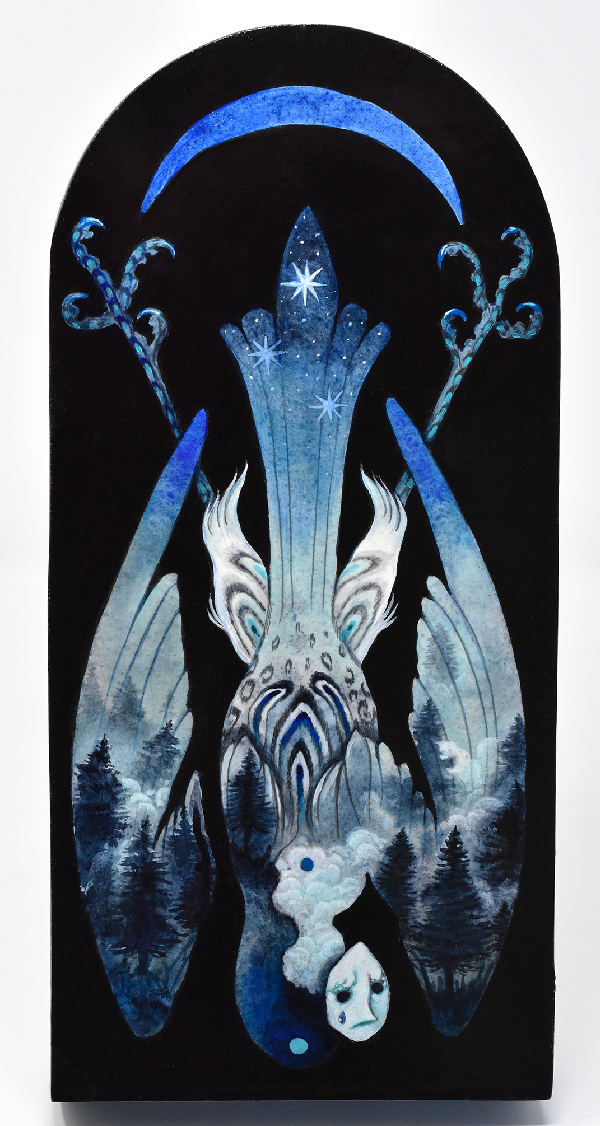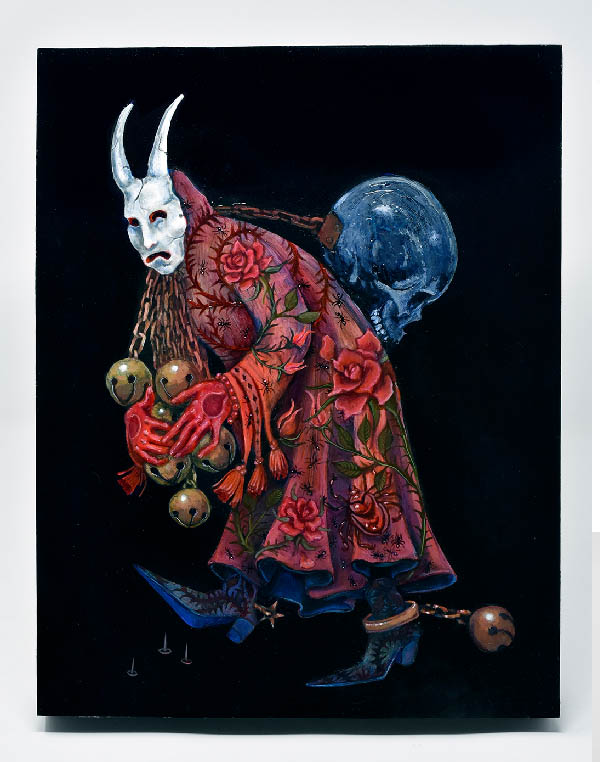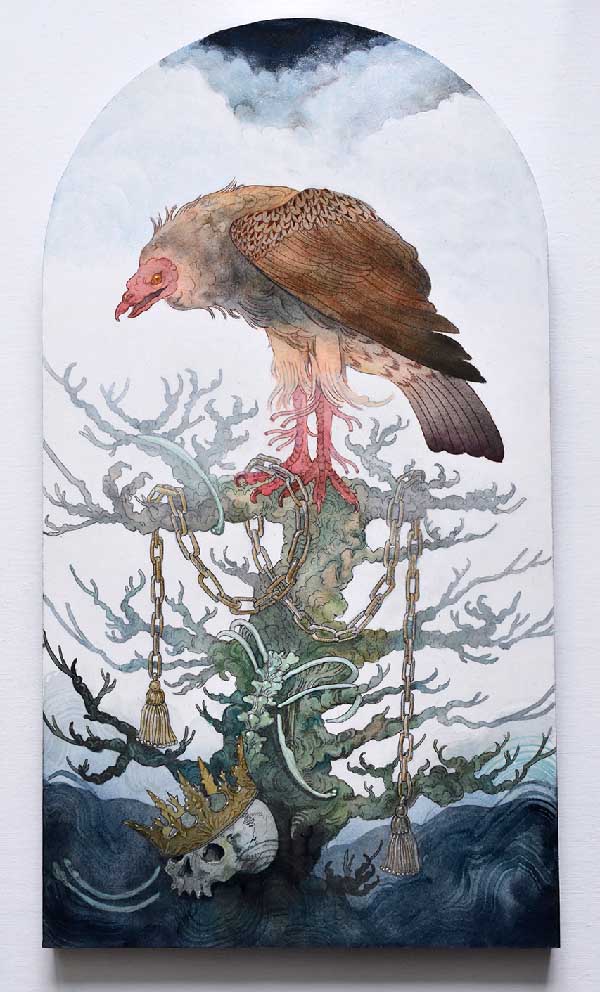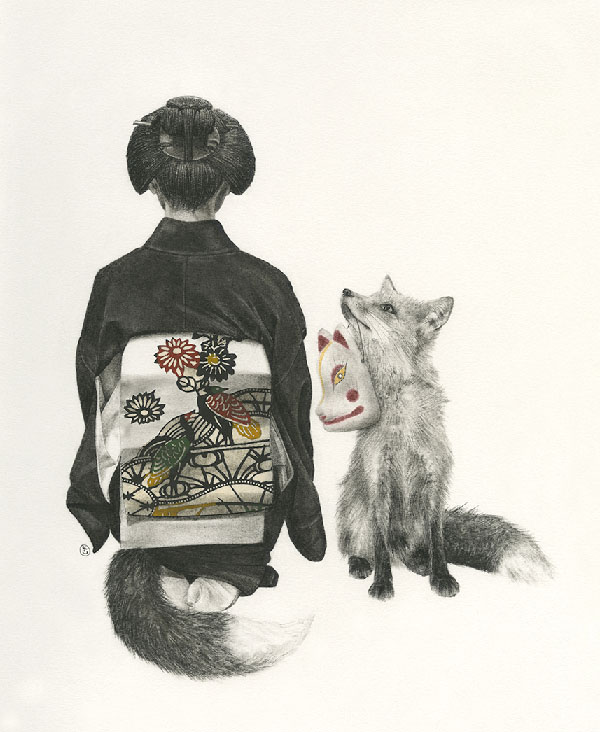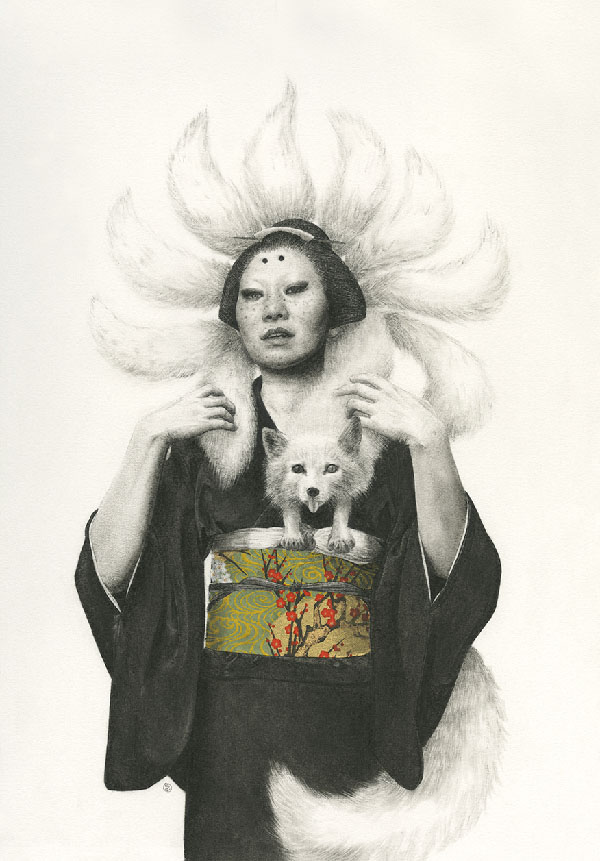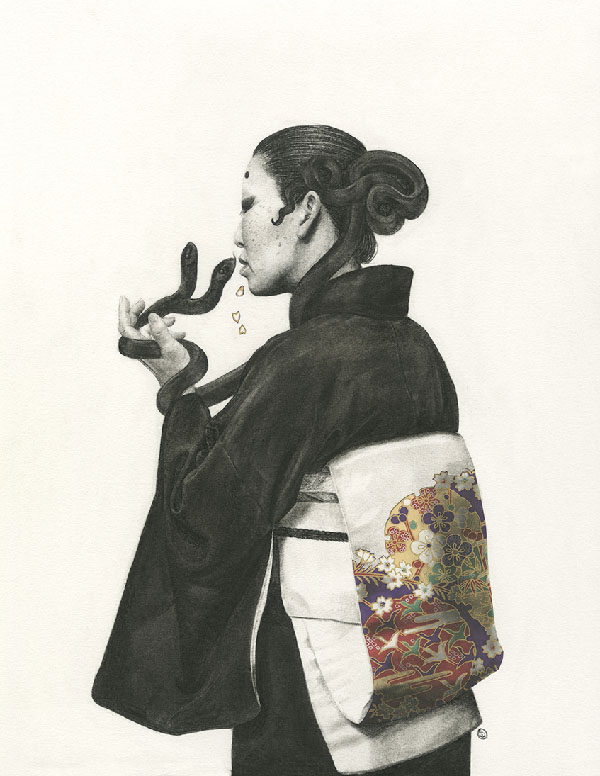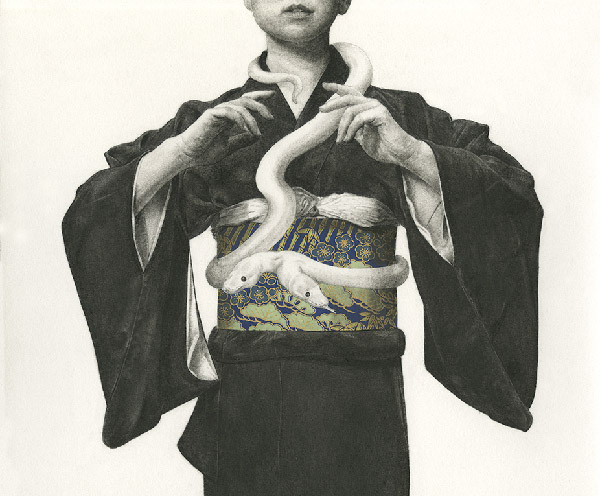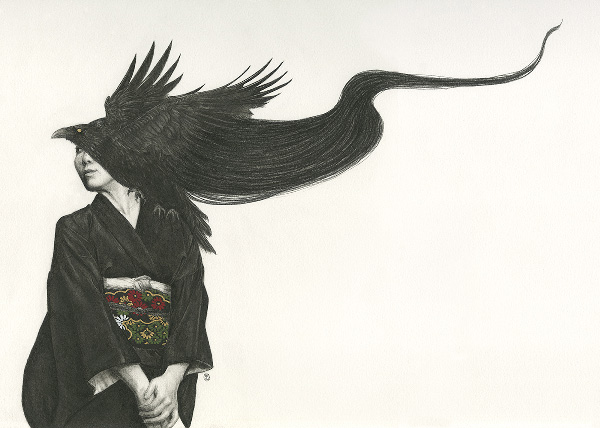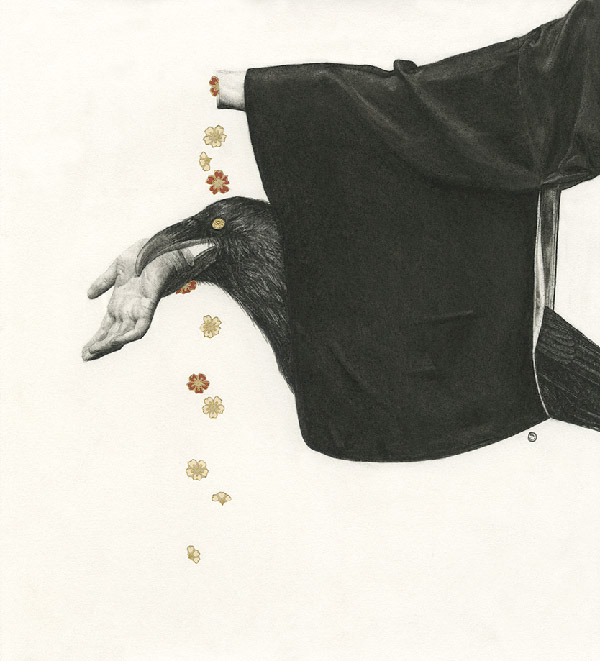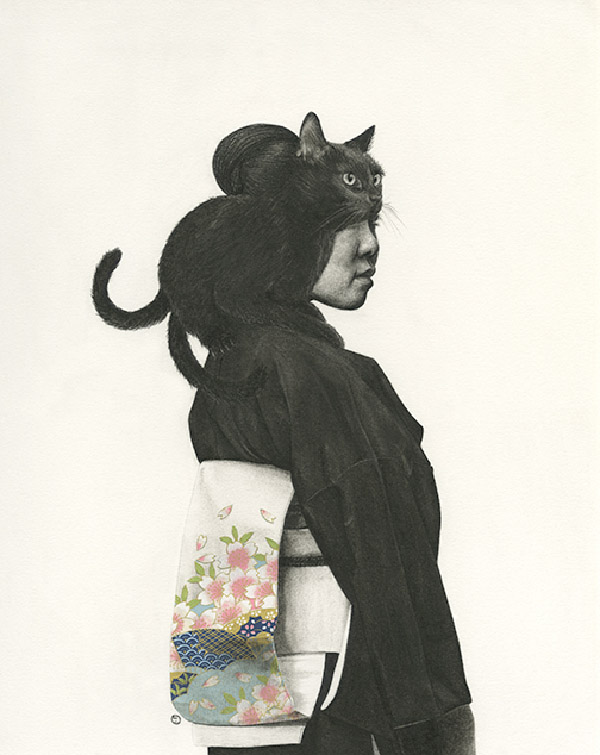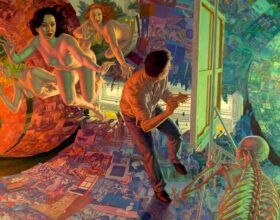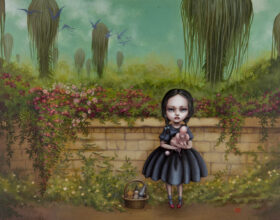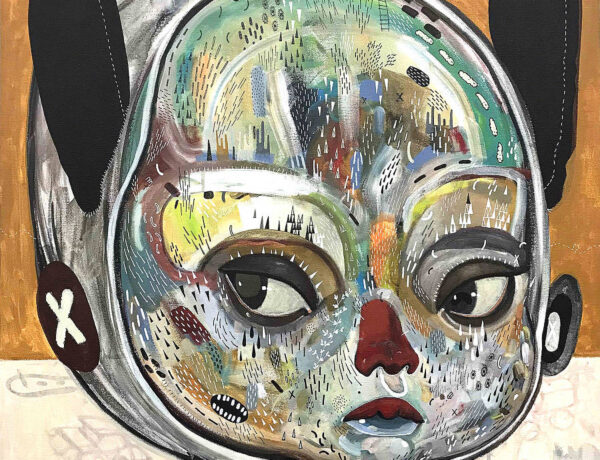Morgaine Faye and Stephanie Inagaki’s work both seem to pull from deep mythological histories to build ancient worlds of wonder in our present. Faye’s artwork are objects crafted from the finery and beauty of nature, resulting in reliquaries to be admired and protected. Inagaki’s work reshapes the mythologies and folklore of Japanese Culture, taking the characters, imagery and narrative’s elements, re-aligning them to tell new tails of love, sacrifice and grief.
These two artist hold their own unique style, each expressing their refined talents and complex imagery. In conjunction with Stephanie and Morgaine’s recent solo exhibitions at Talon, we spoke to them about their work and hope you enjoy!
Morgaine Faye: Opulent Corpse
Stephanie Inagaki: Familiars
Talon Gallery
2724 NE Alberta St. Portland, OR.
For additional information and images, please contact Susannah and Neil at [email protected]
Morgaine Faye | Opulent Corpse
Portland artist Morgaine Faye previously exhibited at Talon Gallery back in 2016. Her latest solo show features a collection of both paintings and relics. Below are some words from the artist about the series.
With your work in your exhibition, what have you tried to achieve, communicate, or observe with the works for the show?
Decrepit, dusty bones, long rid of flesh, lovingly articulated and delicately wrapped in rose-patterned lace, stitched with golden threads, embellished with jewels, and posed on high.
Historically, reliquaries held the remains or belongings of holy individuals, preserving them in intricate structures, surrounded by elaborate ornamentation, exhibiting their divine importance. Precious objects, carefully protected, to be revered for generations.
These new reliquaries seek to preserve and exhibit the inherent divinity of nature. Utilizing scavenged bones, discarded trophies, fine metals, and precious gemstones – all treasures of the Earth – this work seeks to preserve and transform the terrestrial into the immortal, for all to cherish and revere, forever.
But what good is a legacy without a future?
This body of work was created while pondering of the absurdity of creating art and ‘luxury objects’ such as jewelry, during what feels like the end-times. A crisis of purpose. These works explore this dark mindset, and are centered on a pessimistic and doubtful view about our collective ability to preserve and protect our shared planetary home. Imagine the absurdity of a corpse, dressed in opulent finery, carrying all of its ill-gotten treasures with it into oblivion.
Who will read the epitaph when all language ceases to exist?
The name for the show ‘Opulent Corpse’ captured this absurd feeling, but also has connotations of ‘exquisite corpse’ (the childhood game where you fold a paper into three sections, and three people each take turns drawing 1/3 of the monster) and also ‘Heavenly Bodies’ which is a beautiful book by Paul Koudounaris documenting the elaborately dressed and ornamented skeletons known as the “catacomb saints.” These carefully-articulated bejeweled skeletons are a huge influence to my work, and also the motives behind my work. Rather than Christian saints, I’m suggesting that these other creatures are also deserving of the same elevation, and reverence.
You said of the works you make that they “seek to preserve and transform the terrestrial into the immortal, for all to cherish and revere, forever” but also you can see the absurdity of this when you feel as it is nearing end times. How have you combated, discussed, or explored this “crisis of purpose” while producing the finery of your reliquaries?
My reliquary works are about discovering, collecting, cherishing, remembering, and they also have a connection to memento mori, and the idea that death is the great equalizer. I have a deep fascination with the beauty of the natural world, long admiring the immaculate structures that are bones, teeth, claws, shells… This fascination has led me to become a lifelong collector of found relics and fossils, stones, ephemera, which led me to create jewelry. I have found that through the medium of jewelry and sculpture, I can share this love and appreciation for our world with others, and perhaps encourage people to see beauty where they might not have before. In the big picture, I hope to influence people to not only respect, but foster a love for nature, and more importantly, a desire to protect it, and each other.
Stephanie Inagaki | Familiars
This is Inagaki’s debut feature show at Talon Gallery. The works created, using charcoal and wash paper, are inspired by the mythology and folklore of her Japanese heritage. Inagaki has created her own visual narrative to symbolize these creatures as familiars.
Familiars represent an essential aspect of who we are. They protect us and give us strength as they accompany us on our own personal journey. Sometimes they can be mischievous too. Inagaki portrays creatures that, throughout history, have all had mystical qualities from shapeshifting, guiding the gods, even sometimes adopting the role of gods themselves. She has woven together various characters from Japanese culture and traditional mythology to tell a visual story about grief, metamorphosis, sacrifice and love.
KITSUNE I
KITSUNE II
In your show, you reshape the mythology and folklore of your Japanese heritage to case new stories. Could you tell us the story of Kitsune II, the characters, its history, and the narrative it fits into, that you are telling anew through the broader collection of works?
Familiars – Kitsune I: Kitsune is fox in Japanese and also yōkai who have been known to transform themselves into human, to sacrifice themselves for humans they fall in love with, and can be mischievous tricksters too. For me, I relate to the former more romantic stories of the kitsune but do add some silliness to my works like in Familiars – Kitsune II. There are numerous shrines throughout Japan that are guarded by kitsune statues. As they grow stronger and wiser, the more tails they grow.
How do you define art?
I’ve always had long hair since I was a child and it’s been a form of self-identification. As my work has been a means to visually synthesize my personal experiences, my hair has also been a focal point and source of strength throughout my drawings.
YATAGARASU
With your work in your exhibition, what have you tried to achieve, communicate, or observe with the works for the show?
I’ve been creating self portraiture since my first assignments as an undergrad in art school. It started off as a means of practicality and requirement, but as I left my academic training and transitioned into graduate school which was conceptually focused, combined with poignant and life altering events, it became a means to visually distill what I was experiencing. As more things have happened, combined with my renewed interested in my Japanese heritage, I started to integrate the mythology and folklore. Throughout every culture, these fantastical stories exist to tell very human stories and I think that extra veil helps to draw the viewer or reader in.
BLOSSOM
Could you talk a little about Blossom?
This is the third iteration of my Blossoms drawings. Disembodied hands represent ghosts in my work – whether it is a person, a thought, an action that haunts. They are at times our own ghosts, but every loss can bring light and life if you allow it. If you allow yourself that gift of perspective. At times, grief and death have felt like losing a part of oneself but you keep living and moving forward.
NEKOMATA
Could you tell us a little about the drawing Nekomata?
Nekomata are a type of Japanese cat yōkai (monster) with two tails. There are a couple different kinds and some can shape shift into humans. My cats are my familiars, and this is a portrait of one of them, Bebop. Her sister is Cowboy.
Morgaine Faye Social Media Accounts
Website | Facebook | Instagram
Stephanie Inagaki Social Media Accounts
Website | Facebook | Instagram
Talon Gallery Social Media Accounts
Website | Facebook | Instagram
Related Articles


